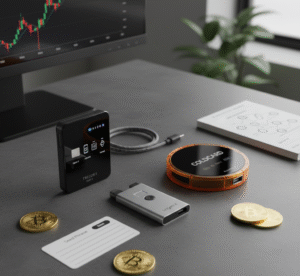Storing crypto securely is crucial. Choosing the right wallet means balancing ease of use with security. Hardware wallets keep your private keys offline for extra safety, while software wallets offer convenience. Below we list 8 top crypto wallets – a mix of hardware and software – suitable for beginners and experts. Each is noted for what makes it safe or special.
Hardware Wallets

1. Ledger Nano X
Ledger Nano X is a popular hardware wallet that keeps private keys offline in a secure chip. It uses a certified Secure Element (CC EAL5+) — the highest standard used in passports and credit cards. Its Bluetooth feature and broad coin support make it convenient. In short, Ledger’s offline design and strong chip make it a very safe option.
2. Trezor Model T
Trezor Model T is another well-known hardware wallet with open-source design. It stores keys offline and enforces PIN entry on the device. Newer Trezor models include a Secure Element and allow passphrase-protected hidden wallets for extra security. This makes Trezor ideal for users who want transparent, high-security key storage on a physical device.
3. Tangem Card Wallet
Tangem is a novel hardware wallet that looks like a credit card. It stores your private key inside an EAL6+ certified chip, so the key is never on a phone or computer. There’s no seed phrase unless you opt in – the key is generated on the card. You simply tap the card on your smartphone to use it. Its tap-and-go NFC design offers “cold wallet” security with the ease of a card, giving daily access without sacrificing safetykraken.com.
Software Wallets
4. Coinbase Wallet (Base App)
Coinbase Wallet (now called Base App) is a user-friendly mobile/desktop wallet from Coinbase. It supports multiple blockchains (multi-chain support) so you can manage Bitcoin, Ethereum, and more in one place. It uses PIN or biometric locks and reminds you to back up your recovery phrase. For beginners, its familiar brand and clear interface make crypto storage easy, while still giving you self-custody control over your keys.
5. Trust Wallet
Trust Wallet is a popular mobile hot wallet acquired by Binance. It lets you store, send, and receive many cryptocurrencies in one app. Trust Wallet is fully non-custodial, so you control your private keys. It includes standard security features like PIN and biometric protection on your phone. Because it supports thousands of coins and has a built-in browser for dApps, Trust Wallet is a versatile choice for both new and experienced users.
6. MetaMask
MetaMask is a widely-used web and mobile wallet that acts as a gateway to Ethereum and other networks. It runs as a browser extension or phone app, letting you interact with DeFi apps and NFTs. MetaMask keeps your keys locally encrypted on your device, and it can connect with hardware wallets (like Ledger) for extra security. Its long track record makes it a trusted pick for Web3 users, and its recent support for multiple networks (including Solana) extends its reach.
7. Exodus
Exodus is a desktop/mobile software wallet known for its sleek design and ease of use. It supports thousands of assets and even has built-in crypto swapping, so coins never have to leave your wallet during trades. Exodus is non-custodial (you hold the seed phrase) and it integrates with Trezor hardware wallets for an extra security layercoinbureau.com. Its beginner-friendly interface and robust coin support make Exodus a strong all-round choice.
8. ZenGo Wallet
ZenGo is a beginner-friendly wallet that takes a different approach: it eliminates private keys using multi-party computation (MPC). Instead of a single seed phrase, your recovery is split across two keys so there’s nothing to lose or back up in a single location. This keyless model removes much of the usual risk of losing a seed phrase. ZenGo’s simple interface and 24/7 support make it especially appealing for new crypto users.
Secure crypto storage comes from choosing a wallet that fits your needs. Hardware wallets like Ledger and Trezor keep keys offline for maximum safety, while software wallets like MetaMask and Trust Wallet offer convenience for daily use. Begginers might prefer user-friendly options like Coinbase Wallet or ZenGo, whereas power users often use a mix of hot and cold wallets for best security. Ultimately, a combination of a trusted hardware wallet and a well-known software wallet can give peace of mind and easy access. Always keep backups of your seed phrases in a safe place, and you’ll be well on your way to storing crypto securely.









